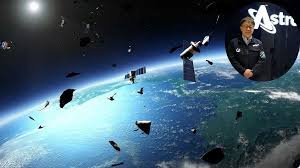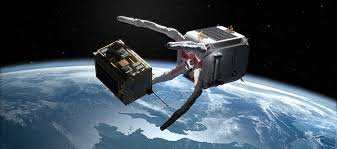Introduction
Bellatrix Aerospace, a leading Indian space-tech startup, has partnered with Astroscale Japan, a global pioneer in space debris removal. This collaboration marks a significant step towards addressing the growing problem of space debris and ensuring sustainable space exploration. The partnership aims to develop advanced technologies for cleaning up Earth’s orbit, which is increasingly cluttered with defunct satellites and debris.
The Growing Concern of Space Debris
With an increasing number of satellites being launched every year, space debris has become a major challenge for space agencies worldwide. Accumulated fragments from defunct satellites, spent rocket stages, and collisions pose risks to active spacecraft, including communication satellites and space stations. Experts warn that without effective debris removal, future space missions could face severe hazards.
Objectives of the Partnership
Bellatrix Aerospace and Astroscale Japan will work together on:
- Developing sustainable propulsion systems for debris removal missions.
- Enhancing debris-tracking technology to improve collision avoidance.
- Creating cost-effective solutions for de-orbiting defunct satellites.
- Advancing in-orbit servicing techniques to prolong satellite life.
Significance for India’s Space Sector
This partnership aligns with India’s growing focus on space sustainability. The Indian Space Research Organisation (ISRO) has been advocating responsible space operations, and collaborations like this will bolster India’s contributions to global space sustainability efforts. Additionally, Bellatrix Aerospace’s innovation in electric and green propulsion technology positions India as a key player in space sustainability.
Global Impact of the Collaboration
Astroscale Japan has been actively working on space debris mitigation through various missions. Partnering with Bellatrix Aerospace allows the integration of cutting-edge propulsion technology into Astroscale’s debris removal missions. This collaboration is expected to set new standards in the commercial space industry, leading to safer and more sustainable space operations globally.

Why This News is Important
Space Sustainability and Safety
With more than 36,000 trackable space debris objects, sustainable space operations have become crucial. This partnership focuses on mitigating risks posed by space debris, ensuring safer satellite operations and reducing the probability of satellite collisions.
Boost to India’s Space Industry
India’s space sector is rapidly growing, with startups like Bellatrix Aerospace playing a crucial role. This collaboration strengthens India’s position in space technology and sustainability, potentially leading to more international partnerships.
Relevance for Competitive Exams
Aspirants of government exams in defense, science, and technology sectors should be aware of such developments as they align with topics related to space advancements, ISRO’s role, and global space policies.
Historical Context
The Rise of Space Debris
Space debris has been accumulating since the early days of space exploration. The first recognized case of space debris was in 1957 when the Soviet Union launched Sputnik 1. Since then, satellite collisions, defunct spacecraft, and discarded rocket stages have contributed significantly to the problem.
Previous Space Debris Removal Initiatives
- Astroscale’s ELSA-d Mission (2021): Aimed at demonstrating debris capture technology.
- RemoveDEBRIS (2018): A European mission testing various debris removal methods.
- ISRO’s Debris Management Plan: India has been working on advanced tracking systems and responsible satellite de-orbiting strategies.
India’s Role in Space Sustainability
India has been focusing on space sustainability with ISRO launching several missions ensuring minimal space debris creation. Bellatrix Aerospace’s collaboration with Astroscale Japan further strengthens India’s commitment to responsible space exploration.
Key Takeaways from Bellatrix-Astroscale Partnership
| S.No | Key Takeaway |
|---|---|
| 1 | Bellatrix Aerospace has partnered with Astroscale Japan to tackle space debris removal. |
| 2 | The partnership will focus on sustainable propulsion and debris tracking technology. |
| 3 | Space debris poses a significant risk to active satellites and future space missions. |
| 4 | The collaboration boosts India’s role in space sustainability and international partnerships. |
| 5 | Space sustainability is crucial for future space exploration and commercial space missions. |
FAQs: Frequently Asked Questions
1. What is space debris?
Space debris consists of defunct satellites, spent rocket stages, and fragments from past collisions that remain in Earth’s orbit, posing risks to active spacecraft.
2. How does the Bellatrix-Astroscale partnership help in space debris removal?
The partnership focuses on developing propulsion technology and tracking systems to remove debris and ensure safer space operations.
3. Why is space debris removal important?
Uncontrolled space debris can collide with active satellites, causing significant damage and increasing the risk of space missions.
4. What role does ISRO play in space sustainability?
ISRO has been implementing responsible de-orbiting strategies and developing tracking systems to mitigate space debris risks.
5. What is Astroscale’s previous contribution to space debris removal?
Astroscale has launched several missions, including the ELSA-d mission, to test debris capture technologies and sustainable space solutions.
Some Important Current Affairs Links


















 Exciting News!
Exciting News!  Join Our Telegram Channel Now!
Join Our Telegram Channel Now!
 Join our Telegram channel for a thrilling adventure into the world of daily current affairs.
Join our Telegram channel for a thrilling adventure into the world of daily current affairs. 
 Don’t miss out on the latest updates and insights! Click to join now and be part of the knowledge revolution!
Don’t miss out on the latest updates and insights! Click to join now and be part of the knowledge revolution! 
